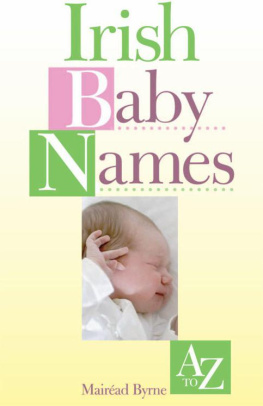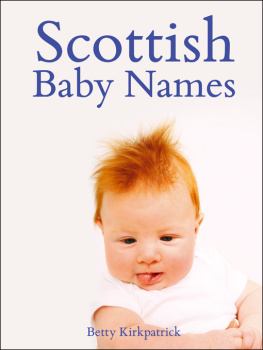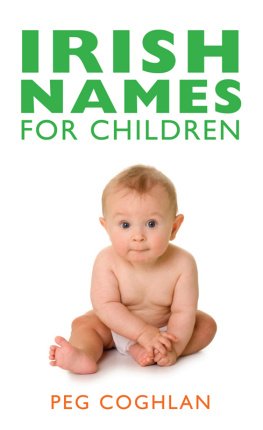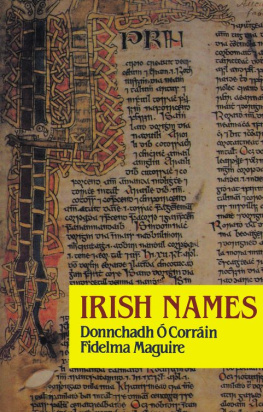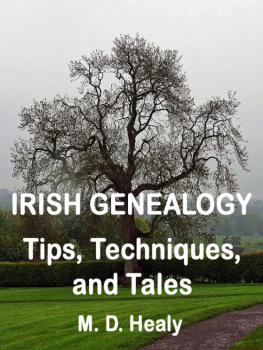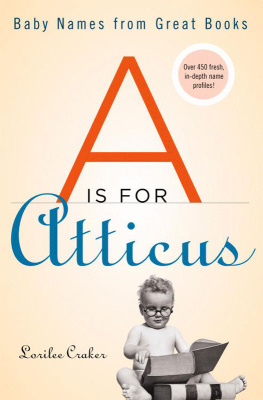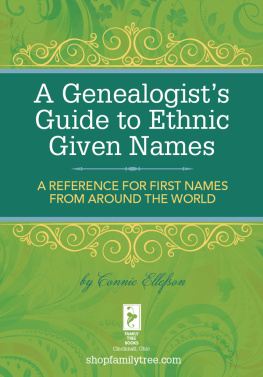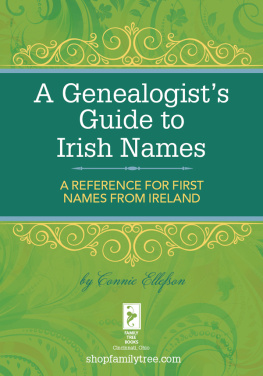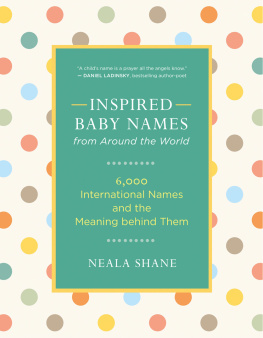
Table of Contents
Introduction
The Irish have always been great travellers, so their names, like the people, have spread throughout the world. Today, Irish names - as all things Irish - are enjoying enormous popularity.
This book offers you a choice of 300 Irish names for your new baby: 150 each for boys and girls. You'll find the most popular current choices (in 2005 the top five for girls were Siobhan, Aisling, Deirdre, Niamh and Eileen, and for boys, Aidan, Liam, Declan, Ciarn and Conor), along with lots of very old names and many unusual ones.
In Ireland, many names are used for both sexes, with surnames often used as first names too.
Far more Irish boys' names exist than girls', reflecting the fact that Ireland was a patriarchal society, and most historical records are concerned with the activities of men not women.
Making your choice
Many Irish names have several different spellings, which have been moulded and adapted by history. To make it as easy as possible to choose, we have listed girls' and boys' names in alphabetical order, under the most commonly used form of the name, with information on the meaning and background of each.
Where applicable, we've also given alternative spellings, including the Gaelic form if it's different, other older forms and the anglicised version if there is one. In some cases, the anglicised spelling is now the most commonly used form.
So you'll often find that not only do you have a choice of name, but a choice of the form too. You may prefer the spelling and sound of an older version of a name to the contemporary one. You're spoiled for choice!
Where do Irish names come from?
Irish names reflect the country's turbulent history. Over 12,000 Irish names were recorded in early sources, with thousands falling out of use in the Middle Ages. Many were introduced into Ireland by invaders, with the Irish adopting the names and finding their own forms.
Some have Celtic origins: the Celts - or Gaels - arrived from about 700 bc onwards, bringing the Gaelic language to Ireland. Other names came in with the Norse invaders - the Vikings - in the ninth and tenth centuries.
Christianity, which was brought to Ireland by St Patrick in the fifth century, is also a source: names with Christian and Hebrew origins remain popular. Others are drawn from Latin, Greek and the Teutonic languages.
Many are saints' names. The Irish have hundreds of saints, and some children are given the name of the saint on whose feast day they're born or baptised. Others are the names of Irish heroes or historical figures.
Most names, however, came from the French and then the English invaders (the Anglo-Normans) from the twelfth to the fourteenth century; many of the English names had Saxon and Germanic origins. These Anglo-Norman names almost entirely supplanted the old Gaelic ones.
The process continued under the Tudor and Stuart settlements and under Cromwellian rule and colonisation in the seventeenth century.
As English became the dominant language, particularly in the nineteenth century, English, biblical and classical names replaced indigenous Irish ones.
However, the Gaelic revival, in the late nineteenth and early twentieth centuries, saw a return to fashion of many old names drawn from Gaelic myths, legends and folklore.
Some names are so well travelled (e.g. Brian, Sheila) that the original Irish source of the name has almost been forgotten. Others have become so international (e.g. Kevin) that the modern anglicised spelling has taken on a life of its own, apart from its original Gaelic form (Caoimhn).
The influence of mass media (television, radio and the internet), along with cheap travel and mass tourism, are also factors. The world gets ever smaller, with Irish names exported worldwide and new names from other parts of the world added to the 'Irish collection' all the time. The popularity of some of these new names may endure; others may vanish as quickly as they arrived - in some cases, mercifully.
Why choose an Irish name?
Many factors influence parents in their choice of name. They may want to continue a family tradition, by giving a child a relative's name, often a grandparent, or one traditionally used in their family.
Those with an Irish background may choose a name that reflects their heritage: their patriotism for Ireland and its history.
Parents' own religion may be a factor: some names are specific to Catholic families, and Catholics often name their children after a pope.
There's also a current revival of interest in old Irish names, in names of historical figures who became saints and in names from Celtic mythology. You may find yourself so beguiled by the stories from Celtic myth and legend that you want to find out more. Plenty of websites carry information on the most famous Irish epic stories; www.babynamesof ireland.com is one of the best.
Fashion and changes in taste are also deciding factors. The current popularity of Irish names is just one manifestation of the vogue for all things Irish over the last 15 years or so, from theatre to tourism. The Celtic economic tiger is still roaring. Since the late 1980s it has changed Ireland - and the attitudes of the rest of the world to Ireland - out of all recognition.
The rich and expressive meanings of Irish names also account for their popularity. You can, if you wish, name your child according to the colour of their hair or their skin (dark, fair or red, for example); after flowers, trees, animals or birds; or after their individual qualities. Whatever your baby's looks or character, you'll find a name to fit.
Finally, the attractive nature of an Irish name is often reason enough to choose it. Whether you have Irish connections or not, the older forms, including the Gaelic, have poetry in them: they sound and look just beautiful.
Please note:
- In the information provided with each name the form mac Nill means 'son of Niall'; Mac Neill is the Irish surname; MacNeill is the anglicised surname.
- All dates are ad, unless stated otherwise.
Irish Gaelic
Gaelic is a Celtic language, part of the Indo-European family of languages. There are several types: Irish Gaelic, Scottish Gaelic, and Manx form one group; Welsh, Cornish and Breton another. Irish Gaelic is usually just referred to as Irish, and we have followed this convention here.
Until the seventeenth century, Irish Gaelic (pronounced 'Gallic') was spoken by the whole Irish population. By the nineteenth century, the dominance of English had almost made it extinct. There was a Gaelic revival at the end of the nineteenth century and the beginning of the twentieth, however, and again after the formation of the Irish Free State in the south in 1922. A standard written form of Irish Gaelic was instituted in 1945.
Today about 500,000 people speak Irish, about one-seventh of the population of the Republic of Ireland. Irish Gaelic is the official language, but English has become the primary spoken language. However, the government has set up revival programmes for Irish Gaelic and it is now taught in all Irish schools.
The Irish alphabet has only 18 letters (13 consonants and 5 vowels), compared to 26 in English. The remaining letters appear in words that have been borrowed from other languages, but are not used in Irish Gaelic words.
Some Irish words resemble English ones, but have a very different meaning: bean means 'woman', fear means 'man', bd means 'boat'. Unlike English words, Irish words also have a gender, as in French or Italian, but it is not always logical: cailn ('girl') is masculine and bean ('woman') is feminine.
Next page
